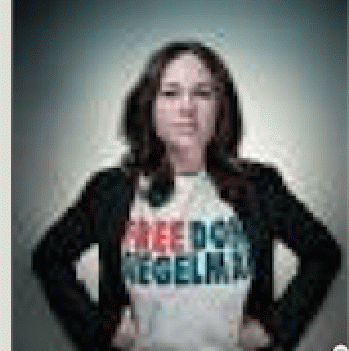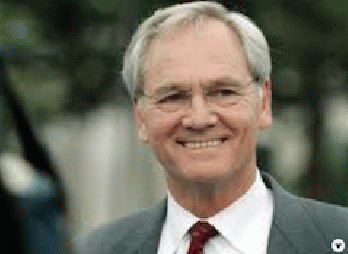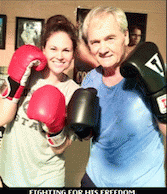| Back OpEd News | |||||||
|
Original Content at https://www.opednews.com/articles/Magistrate-s-Deceit-in-Sie-by-Joan-Brunwasser-Alabama_Deceit_Democrat_Don-Siegelman-150119-706.html (Note: You can view every article as one long page if you sign up as an Advocate Member, or higher). |
|||||||
January 19, 2015
Magistrate's Deceit Discovered in Siegelman Case - Does Anyone Care?
By Joan Brunwasser
The bipartisan criticism of the Siegelman case has come because the former governor and codefendant engaged in standard behavior in our political system. That has never been considered illegal, but it was in the Siegelman case. Obama has appointed donors to ambassadorships and other positions; Reagan did the same, never dr[awing] the whiff of an investigation, much less an indictment, trial, conviction, and incarceration.
::::::::
My guest today is Legal Schnauzer, Roger Shuler. Welcome back to OpEdNews. You have been closely following the Don Siegelman case. You just wrote Oral arguments in Siegelman case might be overshadowed by reports about magistrate's deceit. The case dates back a number of years and many of our readers have not kept up with it. What can you tell us, Roger?
Siegelman remains incarcerated at a federal prison in Louisiana, but he is seeking a new trial, based primarily on allegations that then-U.S. Attorney Leura Canary had a conflict of interest, did not abide by her recusal, and deprived the former Alabama governor and codefendant Richard Scrushy of their constitutional right to an impartial prosecutor. Oral arguments were heard on Monday, Jan. 12, 2015, at the U.S. Eleventh Circuit Court of Appeals in Atlanta. It probably will be several months before a ruling comes down.
There have been lots of twists and turns along the way. Once, the most popular Democrat in Alabama, having won all four top offices, Siegelman and his case have garnered attention from both sides of the political fence. A bipartisan collection of over 100 former state attorneys general from across the country stood behind him. What was all that about? And isn't it a bit unusual in these days when politicians and political figures can't seem to agree on anything?
I think the bipartisan criticism of the Siegelman case has come because the former governor and codefendant Richard Scrushy engaged in standard behavior in our political system. Scrushy made a $500,000 contribution to an education-lottery campaign, and Siegelman appointed Scrushy to a health-care review board--on which the former HealthSouth CEO had served under three previous governors. That kind of transaction has never been considered illegal, but it was in the Siegelman case. President Obama has appointed donors to ambassadorships and other positions; President Reagan did the same thing. Those appointments never drew the whiff of an investigation, much less an indictment, trial, conviction, and incarceration. So why did it happen to Don Siegelman? The whole ugly process has turned the notion of "equal protection under the law" on its head. That's why many people think this was a political prosecution directed by Karl Rove, who has a long history in Alabama, in order to ruin a Democrat that Republicans couldn't beat in a red state.
Speaking of President Obama, a presidential pardon seems like a no-brainer. Yet, this administration has been hostile to Don and his case. Can you talk about it and any theory you might have about that?
That's tricky. I voted for Obama twice, but I think his performance on justice issues has been dismal. Here in Alabama, our courts (both state and federal) are just as corrupt as they were under Bush II. It's as if Obama does not care about concepts like "due process" and "equal protection," which we find in the 14th Amendment. Pretty amazing that a one-time constitutional scholar, and our first black president, would seem to care so little about notions that help form the basis for civil rights in the U.S. Why has Obama been so hostile toward the notion of a Siegelman pardon? I can only think of two possible reasons: (1) He's concerned about political fallout from the right, whose mostly white supporters already seem to hate Obama because of the color of his skin; (2) The right has some unseemly information about Obama and/or his associates that might get loosed if he pardons Siegelman. I hope there is some third reason I haven't thought of because those two create ugly scenarios, indeed. One positive I can say about Obama on justice issues: He said shortly after being elected that he was going to "look forward, not backward" regarding possible criminality committed under the Bush administration--and the president has been true to his word. Obama's policy is short-sighted and nonsensical--some would argue that it's unconstitutional--but that has been his approach, and he has stuck to it. Don Siegelman, his family and friends, and other victims of Bush-era criminality have suffered because of it. I think the Democratic Party also has suffered, garnering poor election results that would have been much better if the public had been shown the full extent of GOP corruption.
Although you and I have both individually and together covered the Siegelman case for years, many of our readers are surely unaware of more recent developments. Let's talk about your column cited above. Your headline refers to a certain "magistrate's deceit". Can you tell us more about that?
Yes, a U.S. Magistrate judge named Charles S. Coody (Middle District of Alabama) was assigned to hear motions from Siegelman and Scrushy, seeking a new trial. Two of their grounds for new trial were: (1) That prosecutors threatened and coached key government witness Nick Bailey and failed to turn over a three-ring binder where he allegedly kept notes of what he was being told to say; (2) That Leura Canary*, then U.S. attorney for the Middle District of Alabama, did not actually abide by her announced recusal. Canary's husband, Bill Canary, had worked for Siegelman's political opponents (and is extremely close to Karl Rove), so she had a major financial conflict of interest. She and her family stood to make money from Siegelman being out of the picture, and her failure to actually stay out of the case deprived defendants of their constitutional right to an impartial prosecutor.
Coody states in court documents that he ordered all documents requested by defendants, reviewed them in camera (privately, in his chambers) and found no "exculpatory matter," nothing to help defendants' cases. We just learned last week that lawyers for both Siegelman and Scrushy state in briefs that Coody never reviewed the Canary material--he ordered the Bailey documents, but never ordered the Canary documents. This means information about Leura Canary's supposed recusal has never been reviewed, and maybe more importantly, a federal judge lied about how he handled it.
As your readers know, legal cases are driven by precedent--both the kind that is longstanding and the kind that is recent. In subsequent rulings, both trial and appellate judges have repeatedly denied Siegelman and Scrushy motions, based to a great extent on Coody's ruling that he found nothing helpful to defendants in the Canary documents. Even the denial in December 2014 of Siegelman's request to be released from prison to help prepare for his January 2015 appeal was based largely on Coody's ruling.
Coody made his ruling in June 2012, but we just learned about his dishonest actions last week. I broke the story on my Legal Schnauzer blog, but so far, it has not been picked up in the mainstream press. In my view, Coody might have committed criminal fraud, and if others are covering for him, that could lead to conspiracy charges. In terms of the justice system and the Siegelman case, this is a much bigger story than the wife-beating saga of trial judge Mark Fuller. Any kind of domestic abuse is always alarming, but the Fuller story mostly is about his behavior in private. The Coody story is about corruption at the heart of the judicial process; it's about deprivation of fundamental rights and abuse of a system that we all fund with our tax dollars. My hope is that it will reach an audience that goes far beyond my blog.
The big question: What is in the Canary documents, e-mails and such, that multiple judges so badly want to keep out of public view?
I never cease to be disappointed and dismayed by the laziness and lack of curiosity on the part of many in the corporate press. Might I ask how you came up with this rather startling discovery about Judge Coody? And if you found this information, might some other intrepid reporter have done the same, even as much as several years ago?
Yes, I just stumbled upon it. I was doing some research on Siegelman's request to be released pending his appeal and found the material in his brief. I then checked the Scrushy brief on the same issue, and it also said that Coody never ordered the Canary material. I then checked Coody's ruling, where he says he reviewed all documents requested by the defendants, and realized (as Scrushy's lawyers state) that "isn't consistent with the record."
I should have noticed this back in 2012 or '13. It's all right there in the public record. In my defense, I guess, these legal briefs are usually 40 to 80 pages long--filled with a lot of legal lingo--and it's easy to miss stuff. Plus, I think bar rules prohibit lawyers from bringing issues critical of judges to public attention via the press. It's up to reporters to find it ourselves, and sometimes we either miss it or just don't have the time to read every word of lengthy documents--in case that has generated probably several hundred documents..
I'm glad I found it now, but I should have found it sooner.

Don Siegelman's daughter Dana sporting a Free Don Siegelman T shirt
(Image by donsiegelman.org/) Details DMCA
Don't beat yourself up about it. You're light years ahead of anyone else on this one. I'm glad you found it, too. It makes me shudder that this story was hiding in plain sight all this time. It could so easily have continued to be overlooked. We have now spotted some egregious judicial behavior. This case has been plagued by that, by various judges along the way, including the conflict-of-interest, wife-beating Mark Fuller. [is it okay to say that?] Pragmatically speaking, what difference does it make? If the judges are corrupt, incompetent or both, what makes you think that anyone will give your revelations the attention they deserve?
Good question. The Eleventh Circuit Court of Appeals certainly is not going to do anything about it. They've already denied Richard Scrushy's appeal, in which he raised the Coody issue, and the three-judge appellate panel just ignored it. It looks like the Obama DOJ is going to sleepwalk through the entire eight years he's in office. So, I don't necessarily think my revelations will receive much attention--beyond what I give them on Legal Schnauzer. And I have more posts coming on the subject. The only way I see to advance this issue is for the public to become engaged and somehow reach key media outlets that might take it to a broader audience. This is a case of a judge cheating and lying in a way that has caused individuals to go to prison and have unjust felony convictions on their records. If the public doesn't care about a story like that . . . well, God help our democracy.
You can say that about the whole Siegelman case, Roger. Making a crime out of something that isn't a crime puts all politicians at risk - all of those who have to raise money for their campaigns, which is virtually everyone. So, why hasn't that aspect caught the attention of the press or, at least, politicians who could also be swept up in this just like Don Siegelman was?
I don't know, Joan. In Alabama, we've become pretty much a one-party state, and I think the Siegelman case has a lot to do with that. Democrats can't even find candidates to seriously run for many statewide offices, especially judicial seats. Why run for public office if it puts you at risk for prosecution, whether you committed a crime or not? Why give to a candidate for office, if it puts you at risk of prosecution, even if there was no illegal "quid pro quo"? Of course, if Democrats ever become nasty and ruthless, they could turn the tables on Republicans. It endangers our whole system, but the public doesn't seem to get that.
Sadly, I can't disagree with your assessment. Anything you'd like to add before we wrap this up?
I think the Charles Coody story is extremely important, and the mainstream press needs to treat it that way. Coody's actions, and the actions of those who might be covering for him, point to possible criminality. They also make you wonder what might be revealed in the Leura Canary recusal documents. Was someone pulling her strings during the Siegelman prosecution? How high does the wrongdoing go? The public needs answers to these questions--and more.
Agreed. I understand that you will continue covering new developments. Let's do this again on a more regular basis so you can fill us in. Thank you for doing the heavy lifting, Roger. It's always a pleasure to talk with an intrepid journalist.
***
Free Don Siegelman website
Dana Siegelman's petition to President Obama: Please Restore Justice and Free My Dad!
Andrew Kreig's [New Yorker] Legal Pundit Toobin Seeks Obama Pardon for Siegelman 1.17.2015
Recent piece in Australian press: The Fall of Alabama governor Don Siegelman and his daughter's fight to free him has some inaccuracies but at least it's getting some coverage, albeit thousands of miles and continents away
my prior interviews with Shuler:
Obama A Big Hypocrite? Ask Legal Schnauzer, Roger Shuler May 9, 2013
Roger Shuler Muses on Justice Department's Odd Priorities 2.9.2013
Exclusive Interview with Legal Schnauzer's Roger Shuler 5.3.2009
Interview with Legal Schnauzer's Roger Shuler, Part Two 5.4.2009
Prior article about Shuler:
Andrew Kreig: Alabama Journalist Roger Shuler Beaten and Arrested!10.26.2013
*To learn more about Leura Canary's prosecutorial misconduct in the Siegelman case, see my interview with whistleblower Tamarah Grimes, Canary's paralegal: More Collateral Damage from the Siegelman Case: Talking with DOJ Whistleblower, Tamarah Grimes , October 8, 2009
for more background, see Hollywood Director John McTiernan's documentary The Political Prosecutions of Karl Rove
BOP: 'Til Death Do Us Part? The latest in my series [32 and still going strong] of interviews with Judy White, wife of Gary White, imprisoned for not perjuring himself in Siegelman case.
Authors Website: http://www.opednews.com/author/author79.html
Authors Bio:
Joan Brunwasser is a co-founder of Citizens for Election Reform (CER) which since 2005 existed for the sole purpose of raising the public awareness of the critical need for election reform. Our goal: to restore fair, accurate, transparent, secure elections where votes are cast in private and counted in public. Because the problems with electronic (computerized) voting systems include a lack of transparency and the ability to accurately check and authenticate the vote cast, these systems can alter election results and therefore are simply antithetical to democratic principles and functioning.
Since the pivotal 2004 Presidential election, Joan has come to see the connection between a broken election system, a dysfunctional, corporate media and a total lack of campaign finance reform. This has led her to enlarge the parameters of her writing to include interviews with whistle-blowers and articulate others who give a view quite different from that presented by the mainstream media. She also turns the spotlight on activists and ordinary folks who are striving to make a difference, to clean up and improve their corner of the world. By focusing on these intrepid individuals, she gives hope and inspiration to those who might otherwise be turned off and alienated. She also interviews people in the arts in all their variations - authors, journalists, filmmakers, actors, playwrights, and artists. Why? The bottom line: without art and inspiration, we lose one of the best parts of ourselves. And we're all in this together. If Joan can keep even one of her fellow citizens going another day, she considers her job well done.
When Joan hit one million page views, OEN Managing Editor, Meryl Ann Butler interviewed her, turning interviewer briefly into interviewee. Read the interview here.
While the news is often quite depressing, Joan nevertheless strives to maintain her mantra: "Grab life now in an exuberant embrace!"
Joan has been Election Integrity Editor for OpEdNews since December, 2005. Her articles also appear at Huffington Post, RepublicMedia.TV and Scoop.co.nz.


